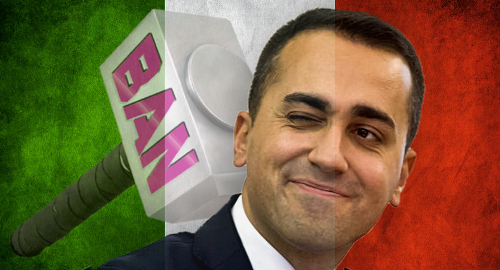 Italy’s gambling operators are slowly learning that the country’s new leaders aren’t joking about their plans to rein in the industry.
Italy’s gambling operators are slowly learning that the country’s new leaders aren’t joking about their plans to rein in the industry.
On Thursday, Luigi Di Maio, Italy’s new deputy premier and leader of the Five Star Movement (M5S) party, made several unflattering references to the country’s gaming industry, in particular the thriving online gambling sector.
Last month, Italy’s new coalition government unveiled a platform that included a more than one-third reduction in the number of amusement with prizes (AWP) machines and video lottery terminals (VLT) in retail venues, plus “strong limitations on forms of gambling with repeated bets” and an “absolute ban on [gambling] advertising and sponsorships.”
On Wednesday, Di Maio (pictured) issued a ‘dignity decree’ that, among other things, calls for “the prohibition of gambling advertising.” Speaking with radio station Rtl 102.5, Di Maio said the coalition had a lost list of grievances with the gaming industry but would “start with advertising.”
The coalition has introduced legislation that would prohibit “any form, direct or indirect, of advertising propaganda, of commercial communication, sponsorship or promotion of brands or products of games with cash prizes, offered in collection networks, both physical and online.”
Di Maio, whose new role as Minister for Economic Development, Labor and Social Policies gives him responsibility over telecommunications issues, claimed that the coalition’s opposition to online gambling advertising was based on the belief that online action was “even more alienating” than slot machines in a local bar, since you can gamble online without leaving your home.
Land-based electronic gaming machine operators weren’t spared Di Maio’s scorn, as he referenced “dark rooms where people enter in the morning and leave in the evening” without noticing the passage of time. Di Maio said this behavior was “destroying families.”
Di Maio insisted that the coalition wasn’t out to “eliminate [gambling] altogether,” because that would only drive the activity into the hands of Italy’s organized crime groups.